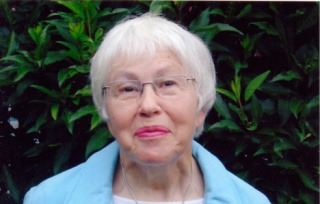It’s safe to say that the current generation probably knows very little about World War I.
But one island poet and anti-war activist, Ann Gerike, is determined to bring part of that war’s story, and in turn the terror of all wars, to mainstream readers.
The Coupeville poet is using her craft to create a series of poems entitled “About Face” (a working title) to reveal the story of English soldiers whose faces were blown off in the trenches and then reconstructed by an innovative surgeon who was ahead of his time.
Gerike recently won the Winner Founders’ Circle Award 2008 from the Whidbey Island Writers Association for her poem “Blessed Are The Hashmakers.”
Additionally, her poem “Going Up” took first place in the Washington Poets Association 2007 William Stafford Contest.
In that poem, Gerike’s pacifist politics are revealed as she recalls a childhood memory of a department store elevator ride — “its ropey intestines dangling” — and overheard conversations between her parents about “boys being maimed and slaughtered in two theaters.”
Coupled with her penchant for poetry and her anti-war politics is the fact that Gerike’s mother was one of the first patients to receive a radical jaw replacement using one of her ribs.
All this gave rise to Gerike’s impetus to plunge whole-heartedly into writing about the fascinating world of facial surgery in World War I England.
“I was haunted by a fellow student’s face who reacted to a poem I’d written about my mother having her jaw removed,” Gerike said.
The student was horrified and the impression stayed with Gerike.
Not generally a history buff, Gerike found herself with the war on her mind after she saw “Oh What A Lovely War!” a musical by Joan Littlewood that was later made into a film by Richard Attenborough.
She started to research World War I in earnest.
The war took place between 1914 and 1918 and almost literally exterminated an entire generation of Englishmen.
But Gerike discovered that what was even more tragic was that many of the men who did survive suffered horrific facial injuries and were unidentifiable even to family and friends when they returned home to England.
Ravaged by high explosives and heavy artillery, the first World War’s casualties were such that men were often unable to see, hear, speak, eat or drink because of their injuries. Needless to say, they struggled to re-assimilate into civilian life.
The tragedy of these men having to live with severely distorted faces, and the psychological effects of such wounds, catalyzed a New Zealand surgeon named Sir Harold Gillies to transform the discipline of plastic surgery from its fledgling first stages.
Gillies used his intense observation of the profoundly wounded and his surgical ability to push the parameters of facial reconstruction beyond the techniques of the day. Combining his surgical abilities with a talent for art and design, he managed to give the severely wounded some semblance of a normal life beyond their war wounds.
Gillies employed the services of painters, sculptors and photographers who documented each patient’s surgical progress from admission to discharge.
That archive of more than 2,500 patient records, documents that charted the birth and development of plastic surgery and had been lost for decades, was rediscovered in the basement of Queen Mary’s Hospital in Sidcup, England.
The following excerpt from the as-yet-unpublished “About Face” relives Gerike’s experience looking at the archived photographs at the Imperial War Museum in London, where she spent some time in the summer.
Photographs from Queen Mary’s Hospital, 1917-1921 Center for Facial Surgery, World War I
I look askance at this sea of mangled faces,
eyes awash in flesh, cocknosed,
slam-mouthed,
slice-tongued, hearing in the trenches
the roar of war, the whiz-bang’s
whistle. There flies a nose, an eye
gone south, all disbanded,
released from active duty, free
to shoot over whatever sea of muck
might suck them in.
“I’m an anti-war activist,” Gerike said. “I want people to realize the terrible effects of war.”
Gerike said she was standing on the curb with anti-war signs long before “Bush’s war” even started, referring to the Iraq War. In that vein, Gerike said she wants to alert everyone to the immorality of all war.
“About Face,” which Gerike hopes to have finished and published within the year, will be for any person who reads, she said, not just World War I buffs or poets or old people.
“Good poetry can be read by everyone; by the average literary person,” she said.
In her poem “The Broken-Faced,” she writes:
When the hounds of war bay you out
into the night, slash at you with iron claws,
we will be there waiting,
ready to take you in,
one of our ruined brothers.


